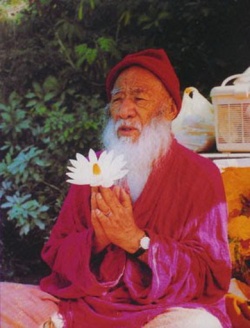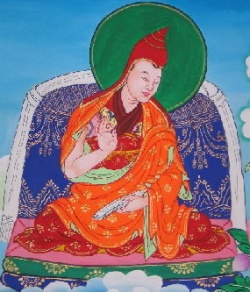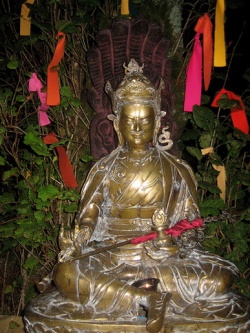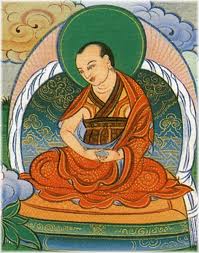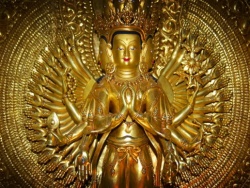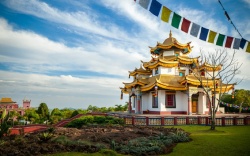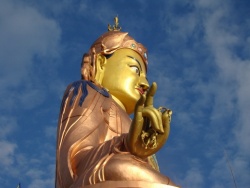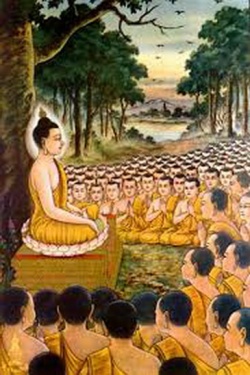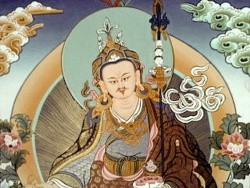Advice for Nyingma Practioners
The Nyingma tradition is the oldest of the four major schools of Tibetan Buddhism (the other three being the Kagyu, Sakya and Gelug). "Nyingma" literally means "ancient," and is often referred to as the "school of the ancient translations" or the "old school" because it is founded on the first translations of Buddhist scriptures from Sanskrit into Tibetan, in the eighth century.
The Tibetan script and grammar was actually created for this endeavour.
In modern times the Nyingma lineage has been centered in Kham in eastern Tibet.
The Nyingma tradition actually comprises several distinct lineages that all trace their origins to the Indian master Padmasambhava, who is lauded in the popular canon as the founder of Tibetan Buddhism and is still propitiated in the discipline of reciprocity that is guru yoga sadhana, the staple of the tradition(s).
Historically, Nyingmapa are categorised into Red Sangha and White Sangha.
Red Sangha denotes a celibate, monastic practitioner; whereas White Sangha denotes a non-celibate practitioner who abstains from vows of celibacy.
At different times in ones life due to changing circumstances and proclivities, individuals historically moved between these two Sanghas. Rarely was either determination of Red or White for the duration of one's life.
Nyingma maintains the earliest tantric teachings which have been given the popular nomenclature of Vajrayana.
Early Vajrayana that was transmitted from India to Tibet may be differentiated by the specific term 'Mantrayana' (Wylie: sngags kyi theg pa).
'Mantrayana' is the Sanskrit of what became rendered in Tibetan as "Secret Mantra" (Wylie: gsang sngags): gsang sngags is the self-identifying term employed in the earliest literature, whereas Nyingma became associated in differentiation from the "New Schools" Sarma.
We used to be able to find the following resource from Chatral Rinpoche in several locations, but now, its availability has dwindled.
So, we have decided to memorialize it here, on the eve of the 2010 Nyingma Monlam, which begins this Saturday. This was originally spoken for the 2000 Nyingma Monlam:
"Since I am the eldest of the Nyingma lamas, I have been asked to share some humble thoughts and opinions with all those who have gathered here this year in the sacred place of Bodhgaya, India on the occasion of the Eleventh Annual Great Prayer Festival of the Early Translation School.
I will therefore speak a few words of advice to express my point of view, so I hope you all listen well.
First of all, I greatly rejoice that by the kindness of many benefactors and volunteers, The Great Nyingma Prayer Festival has been taking place for many years and I myself- an old man- was able to attend it for the first three years.
Now, since we are all followers of the Buddha, we should know that taking meat and alcohol is very bad.
This is one of the main things we should abandon. So the fact that everyone has agreed that we will refrain from meat and alcohol [during the Great Prayer Festival] and realized that there is simply no need for us to take these things is a result of the Buddha’s’ compassion.
Some of you have a lot of responsibility and things to look after- such as taking care of your wife and children- and in reality are therefore unable to accomplish great deeds for the benefit of the Buddha’s Teachings.
As for the excellent tradition of the Great Nyingma Prayer Festival, it has been established in general to restore, preserve and expand the teachings of Lord Buddha and in particular those of the luminous Vajrayana tradition of the Early Translation School which is endowed with the special six-fold greatness.
One should not mix Dharma with worldly affairs because this Festival has been established for the sole purpose of the Dharma.
Therefore, if we allow these two to get mixed together, it is like putting fire and water in the same vessel. If the fire is very strong, the water will dry up.
If the water predominates, the fire will die. So don’t get mixed up with politics. Above all, what do we need to develop Bodhicitta?
Have not all the beings of the six realms–having passed through the bardo and been reincarnated many times- at one point been our mother and father?
By following over and over the path of the Mahayana taught by the Buddha, all temporary and ultimate subtle and gross suffering will be mollified for everyone.
The temporary and ultimate benefits of happiness and goodness will increase further and further.
These days we are living in an age of the five degenerations, also called the “five insurmountables.”
In this wild and unruly time, because of such things as the proliferation of many kinds of evil weapons and the spread of different kinds of poisonous drugs such as tobacco, the Buddha’s teachings are being taken away as if by an untimely frost.
From all angles the explanation and practice of these precious teachings have many obstacles.
Favorable conditions are few. It is like a pond that has lost its water through drought or a butter lamp that has run out of oil.
Everyone knows and understands that it has come to be like this. So, to focus on restoring these teachings is what we mean here by “contributing to world peace.”
Apart from that, you can’t simply take “peace” from one country and export it another one. Each country or state has one person as the leader of that country or state.
Different types of dark forces have transformed the minds of all these people and they view their neighbors with prejudice; the small ones view the big ones with envy, the big ones treat the small ones with contempt, and equally sized ones see each other as competitors.
Because of such biases, they engage in all kinds of wars. Even if the country we live in has peace today, in each country war will eventually be fought.
These conflicts are as numerous as the grass that grows on a summer meadow or the bright stars that come out at night once the sun goes down.
This is something tangible that we can see with our own eyes. So it is in order to pacify these hostilities that we recite prayers of aspiration.
The prayers that we are using in this Festival are Reciting the Names of Manjushri,- which is the quintessence of both the sutras and tantras- and The King of All Aspirations, which is the main prayer according to the sutras.
These teachings have the complete meaning of both sutra and tantra in them.
Along with them, we also recite The Treasury of Blessing, A Sadhana of the Buddha and conclude each day with a prayer that the teachings of the Nyingma Tradition may flourish called The Words That Rejoice the Dharma King (1846-1912).
These are prayers that all of us should include in our daily practice. If that isn’t possible, we should at least not fail to recite them on the 10th and 25th days of the lunar month.
It would be wrong to say, as some do, that if we don’t recite prayers while being aware of their meaning and merely repeat the words mindlessly, it has no benefit whatsoever- like prayer flags flapping in the wind.
However, there are indeed differences in the level of benefits and blessings derived from prayers according to the way we recite them. Therefore, keeping this in mind, at the beginning of the practice generate bodhicitta.
During the main practice some will use an object of concentration; each person should do what is best according to their level. At the end, one should dedicate the merit in a way that is pure from the three conceptual spheres to the best of one’s ability.
The most important and essential thing in making this Great Prayer Festival meaningful is to depend on those three stages of practice-generation of bodhicitta, the main practice and the dedication of merit.
All must do the complete three stages of practice.
Especially because we follow the teachings of the Nyingma Early Translation School, the area of the view, conduct must not get lost and in the area of conduct, the view must not get lost.
As Guru Rinpoche said, In the direction of the view, if conduct gets lost, the view goes to the tarnished state of Mara.
In the direction of conduct, if the view is lost, having become entangled by the hopes and fears of materialism and ideology, real liberation will never come and there is no way you can reach the level of the unified state.
This should be understood. Lamas, tulkus and khenpos have studied many texts and know and understand this, so there is no need for me to remind them further.
These days in our Nyingma Tradition, philosophical colleges and retreat centers are spreading everywhere.
What I have said thus far is no different that what the teachers explain in those centers and what the students listen to.
As a result of our training, we are participating in this large gathering at Bodhgaya during the 12th lunar month- 18th day of this month being the anniversary of the passing of the all-knowing Longchen Rabjam.
Before that day comes- from the first to the tenth – we strive to perfect accumulations [of merit and wisdom] and purify obscurations.
Many devotees who have faith in the Three Jewels and especially in this Great Prayer Festival of the Early Translation School of the Secret Mantrayana have made offerings for the benefit of those who have died, for those who are helpless and without a protector and for all living beings.
Fellow devotees who are in a position to receive these offerings have accepted them.
These religious offerings made for the sole purpose of helping the dead and the living are not something that should be taken lightly.
Pondering the significance of these religious offerings, all of you must do dedication prayers and make pure aspirations for the sake of the deceased.
For the benefit of the living, we serve them with a protective prayer ritual for the sake of long life and prosperity according to their respective inner wishes.
After consulting with the astrologers and doing divination, when the list of prayers to recite in the puja to help that person is announced, make sure you perform the service correctly.
It won’t be beneficial if you don’t chant the prayers and say the dedication, leaving only us to enjoy the faith offerings. This will mature as a heavy karmic burden!
We must purposefully take on this great responsibility and put a seal on the practice by doing aspiration and dedication prayers.
If you put a drop of water into the ocean, until the ocean dries up, the drop of water isn’t going to dry up. Similarly, by virtue of putting a seal on the practice through dedication prayers, the benefits of the practice will not rot or decay until you achieve Buddhahood.
It is the Buddha’s wish that this virtue not be wasted; it is the real essence of the flawless teachings of the Buddhist pandits. Everyone having understood this well; engage in the complete three stages of practice.
Now however, in terms of conduct, it is said that Nyingma monks fight and hit people. Nyingma monks don’t keep their vows or samaya.
Nyingma monks engage in theft. When I heard this it was like thorns piercing my heart.
We old lamas worry and feel responsible for this. Make sure this type of behavior decreases every year.
The leaders must take responsibility for putting a stop to this. In humility, all disciples should follow these lessons of us elders.
Young ones listening to this, you must gain mastery of your own body, speech and mind and make sure there is nothing lacking in your discipline.
At a sacred place and special event like this when there is an ocean-like gathering of people, several of the great holy masters will be among them.
Whoever of these great masters might be present, they should give advice like I am doing and everyone should respect and follow their advice.
If you do this, imagine the manner in which the splendor of the teachings of the Nyingma Early Translation School will develop above and beyond what it is now.
If you don’t do this and try to pass on your responsibility to others, they will be disregarded and people won’t listen.
Even though some have the ability to teach, they don’t use that ability. Other people either don’t know or understand very little of the meaning of the teachings and say things unnecessarily.
There are a few who think that they don’t need to explain general points to others because they are not interested or cannot bear to take on great responsibilities. I think this is wrong.
These who have responsibilities should advise those who don’t, encouraging them to work on their discipline so it will improve year after year and become firm.
If you place one being at a time on the path of discipline, thinking they will stay firmly on this path for at least 100 years, then as long as Buddha Dharma remains, there will be harmony in the monastery with good clean discipline and no reason for others to criticize or judge.
Nyingmapas and all other religious traditions have their own respective rules on discipline.
Each must take responsibility for their own situation. The Nyingmapas cannot take responsibility for other traditions- it can’t be done.
Each of us Nyingmapas have come from either the three provinces, the upper, lower and middle regions of Tibet or been born in the noble land of India, Nepal or anywhere in the Himalayan range east of Ladakh.
There are hundreds of Nyingma monasteries –large and small- in those areas.
In these monasteries, what is known as the Sangha – the monastic community – should distinguish between what is to be accomplished and what is to be avoided according to the three-fold training and the Statements of the Tripitaka.
By doing this, the so-called “noble Sangha” will be the same in both name and meaning.
As it is said: “There is no guide like the Buddha. There is no protector like the Dharma.
There is no fertile field like the Sangha. One should also understand that as a leading figure of the three jewels, the Sangha needs to engage seriously in the teachings of the Buddha and encourage others to do so.
This is what is meant by being “holders of the Teachings.”
Apart from that, even if one is a fortunate business man – no matter how well they did in amassing great wealth- a mansion itself will not make one a holder of the Buddha Dharma.
The nature of one’s clothing will also not make one a holder of the teachings.
Even wearing monks robes will not make one a holder of the teachings.
In reality though, even if a person is a lowly beggar, if they are in harmony with the Dharma they can be called a great person who is a holder of the teachings.
If you don’t become like this, even if one thinks they are a holder of the teachings by being in various positions like the head of a seating row or sitting exclusively on an exalted throne, it is a difficult thing if they may have a correction coming as to whether or not they are a holder of the teachings based on how they live.
If one speaks purely in accordance with the Dharma, it might offend a few.
If what I say is wrong, please forgive me. I openly confess. If is my misunderstanding.
It is a mistake. It is a distortion. It is lack of knowledge.
If it may have also been the phony advice of an old man, I don’t know.
As an old man saying these things—I am discussing that which I don’t have any reason to discuss and saying that which I don’t have any reason to say. All people come to make mistakes like this- not just me.
Everyone has said that there was a need for some spoke advice for this years Great Prayer Festival.
So, someone was sent to me and came to Yangleshod.
At that time, I had been busy satisfying some benefactors elsewhere in the Kathmandu Valley and while being in a great hurry I came to Yangleshod.
As soon as I had gotten out of the car, I spontaneously spoke this advice and did not have time to consult texts or write it down. There was no need to do so anyway.
I don’t expect it to be on the shelf of a Buddhist philosophical Library.
For this year alone, it was suggested that among us elder Nyingma lamas, someone should explain how the discipline should be kept.
That was the opinion of others and I also think this is right.
Other lamas would not feel comfortable listening to the advice of someone who is unknown, so that is why one who is known as a “lama” like myself is speaking out.
Lamas, tulkus, and khenpos who are knowledgeable are qualified to give advice and should do so.
Otherwise, those who just say things in the way of meaningless gossip and talk nonsense will just create conflicts.
There is no benefit whatsoever in saying things that will only go on to increase our attachment, anger and delusion.
Talking this way will harm the Buddha’s teachings and be of help to no one.
For the benefit of all beings, all the practitioners of the teachings of the Nyingma Early Translation School living in monasteries great or small,
from Upper, Middle or Lower Tibet, in a mountain hermitage, a study center with just four monks or even if you are practicing alone;
for all of you year after year when you gather here again at this time, you must take responsibility for upholding your discipline.
For the period of these ten days, if you don’t have something good to say, there is no reason to speak.
You should behave in such a way that no one will have reason to criticize or gossip about your conduct so that you can be a perfect example to lead the faithful and become worthy objects of the accumulation of merit of the benefactors.
I hope and pray that this event will come and to be very good through the planning at the beginning, middle and end.
It will then serve to benefit the great holy beings who hold the teachings of the Dharma.
In the long term, it will also help Buddha’s precious teachings by way of the two chakras of teaching and practice to never fade and instead expand and flourish now and always in the four times and ten directions and abide for a long time.
During this degenerate age in the outer world, there are many natural disasters due to the upsetting of the four elements.
Also, demonic forces come with their many weapons to incite the fighting of wars.
All of those forces have caused the world to come to ruin and led all to tremble—so terrified that their hair stands on end.
Still, the demonic forces find it necessary to come up with new types of weapons.
If we were called on to confront them, there’s no way we Dharma practitioners could defeat them.
That’s why we make supplication prayers to the three jewels, do the aspiration prayers, the offering prayers and the prayers of invocation. We are responsible for those activities.
This is what I urge you to do. So at this great gathering, please think about the pacification of all these forces.
Since I don’t think there is anything inconsiderate or unacceptable in this advice, please listen to it carefully and take it to heart.
If you do so, when the Great Prayer Festival is over, you will have good reason to be happy and will be able to rejoice in the merit you have accumulated.
So, please make it happen that way! May you have a long life! Please—all of you—make vast prayers of aspiration that the precious teachings of the Victorious One may flourish in the ten directions.
That’s about all an old man like me has to say. May you all keep this advice in your minds."
Termas and tertons
The appearance of terma ("hidden treasures") is of particular significance to the Nyingma tradition.
Although there have been a few Kagyupa "tertons" (treasure revealers) and the practice is endemic to the Bönpo as well, the vast majority of Tibetan Buddhist tertons have been Nyingmapas.
It is held that past masters, principally Padmasambhava, secreted objects and hid teachings for discovery by later tertons at appropriate and auspicious times such that the teaching would be beneficial.
These teachings may be physically discovered, often in rocks and caves, or they may be "mind terma," appearing directly within the mindstream of the terton.
Terma
Padmasambhava and his main disciples hid hundreds of scriptures, ritual objects and relics in secret places to protect Buddhism during the time of decline under King Langdarma.
These termas were later rediscovered and special terma lineages were established throughout Tibet.
Out of this activity developed, especially within the Nyingma tradition, two ways of dharma transmission: the so called "long" oral transmission from teacher to student in unbroken lineages and the "short" transmission or "whispered transmission" of "hidden treasures".
The foremost revealers of these termas were the five terton kings and the eight Lingpas.
The terma tradition had antecedents in India; Nagarjuna, for example, rediscovered the last part of the "Prajnaparamita-Sutra in one hundred thousand verses" in the realm of Naga, where it had been kept since the time of Buddha Shakyamuni.
Tertons
According to Nyingma tradition, tertons are often incarnations of the 25 main disciples of Padmasambhava.
A vast system of transmission lineages developed through the ages.
Nyingma scriptures were updated when the time was appropriate. Terma teachings guided many Buddhist practitioners to realisation and enlightenment.
The rediscovering of terma began with the first terton, Sangye Lama (1000–1080).
Tertons of outstanding importance were Nyangral Nyima Oser (1124–1192), Guru Chowang (1212–1270), Rigdzin Godem (1307–1408), Pema Lingpa (1450–1521), Migyur Dorje (1645–1667), Jamyang Khyentse Wangpo (1820–1892) and Orgyen Chokyur Lingpa (1829–1870).
In the 19th century some of the most famous were the Khen Kong Chok Sum referring to Jamyang Khyentse, Jamgon Kongtrul and Chokgyur Lingpa. Orgyen Kusum Lingpa is a living terton.
